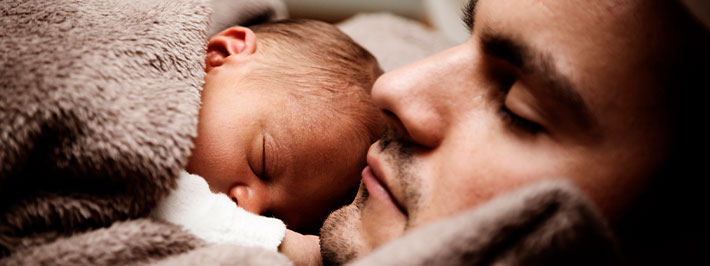
6 ways men change when they become dads
Pregnancy and childbirth cause many physical and psychological changes in a new moms body, but it turns out that men can experience a wide range of body and mental changes as they become parents as well.
Hormonal and emotional roller coasters, strong affection for the new baby, anxiety and depression, and even pregnancy symptoms may seem incredible, but this is what many men experience when their babies are born.
1. Testosterone levels can go down
High testosterone levels are responsible for behavioral traits such as aggression, competition, and attraction to a new partner. But when a man becomes a father, his testosterone level seems to drop, suggesting that now all of a mans attention should be directed within the family, not outward.
Studies show that men who are already in a relationship and those with children have lower levels of testosterone than single men without children. It seems that over time, the male body has learned to lower testosterone levels to change mens priorities and make them devoted fathers.
2. Increase levels of oxytocin and dopamine
Oxytocin and dopamine are two chemicals responsible for the bond between parents and children. If testosterone levels drop, the positive effects of oxytocin and dopamine increase, making new dads more enjoy playing and cuddling with their babies.
3. Hormonal highs and lows can cause postpartum depression in men.
While many of us know what postpartum depression is in women, few of us have heard of it affecting men. Aside from its other functions, testosterone plays an important role in protecting against depression, and when its level drops, young parents can be affected by this mental illness. Hormonal changes, coupled with the burden of the responsibilities of a new father, make men susceptible to mental health problems. That is why it is so important to keep in mind that hormonal and behavioral changes also occur in dads.
4. Certain brain changes can also occur
The scientists studied the brain activity of a group of new parents and found that for the first four months after giving birth, their brains show noticeable gray matter changes. These changes help new parents develop their parenting skills and build a strong bond with their babies. These early parent-baby interactions form a solid foundation for the future parent-child relationship and play an important role in babies cognitive and social development.
It is important to note that a new parents brain may show increased activity in the areas responsible for planning, problem solving, and risk detection. These are the areas that help the father make sure his baby stays safe.
5. Men can even develop pregnancy symptoms when their partner is pregnant.
It is not only after the birth of the child that new parents experience certain changes in their bodies. While their partners are pregnant, men may experience pregnancy-related symptoms such as nausea, changes in appetite, bloating, and back pain. This phenomenon is called sympathetic pregnancy or melancholy. This syndrome, which is not considered a disease, is more common than we can imagine.
6. Men can experience high levels of emotional stress.
Parenting can create high levels of stress and anxiety for new dads, but most dangerous of all, many men feel like they cannot ask for help. New dads often think that this only distracts attention from the needs of new moms who they think are more critical. Men who are new to fatherhood can experience tremendous physical and emotional stress, but they tend to focus all their attention on their wives.
This is why it is so important for both parents to spend time together, to talk about what they have been going through since the babys arrival. It is said that a shared burden is a burden that is cut in half, and sometimes an honest conversation between couples can work wonders.